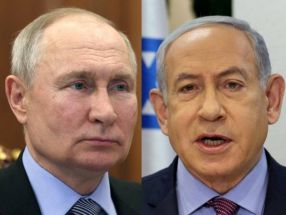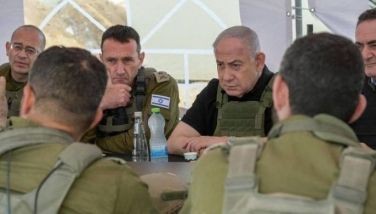Alarm, ridicule for declaration of Islamic state
BAGHDAD — A militant group's declaration of an Islamic state in territory it controls in Syria and Iraq touched off celebrations among its followers but drew condemnation and even ridicule from rivals and officials in Baghdad and Damascus.
The declaration of a caliphate was a bold move by the Islamic State of Iraq and the Levant, not just announcing its own state governed by Shariah law but also claiming legitimacy as a successor to the first Islamic rule created by the Prophet Muhammad in the Arabian Peninsula 14 centuries ago.
In an announcement Sunday, the group proclaimed its leader Abu Bakr al-Baghdadi to be the caliph and demanded all Muslims around the world pledge allegiance to him.
The move risks straining alliances with other Iraqi Sunnis who have helped the militants seize control of large parts of the country's north and west this month.
Those Sunnis, including former officers in the military of ousted dictator Saddam Hussein, have backed the militants in hopes of bringing down the Shiite-led government but not necessarily its ambitions of carving out a transnational caliphate.
Through brute force and meticulous planning, the Sunni extremist group — which said it was changing its name to just the Islamic State, dropping the mention of Iraq and the Levant — has carved out a large chunk of territory that has effectively erased the border between Iraq and Syria and laid the foundations of its proto-state. Along the way, it has battled Syrian rebels, Kurdish militias and the Syrian and Iraqi militaries.
Following the announcement, Islamic State fighters in their northern Syrian stronghold of Raqqa paraded through the city. Some of the revelers wore traditional robes and waved the group's black flags in a central square, while others zoomed around in pickup trucks against a backdrop of celebratory gunfire. Video of the events was posted online, and activists in the city confirmed the details.
The Islamic State expelled rival rebel groups from Raqqa this spring, turning the city of 500,000 along the banks of the Euphrates River into an image of the state it envisions. Activists from Raqqa say music has been banned, Christians must pay an Islamic tax for protection, and violators of the strict interpretation of Islamic law are killed in the main square.
It is unclear whether the Islamic State's declaration heralds the imposition of the same rules elsewhere. So far, the group has taken a more moderate approach in cities under its control in Iraq, including the northern city of Mosul and the central city of Tikrit, choosing to overlook some practices it considers forbidden. But the extremist faction was also more lenient in towns in Syria before eventually tightening its hold.
The announcement was greeted with condemnation and disdain elsewhere in Syria, including from rival rebel groups who have been fighting the Islamic State since January.
"The gangs of al-Baghdadi are living in a fantasy world. They're delusional. They want to establish a state but they don't have the elements for it," said Abdel-Rahman al-Shami, a spokesman for the Army of Islam, an Islamist rebel group. "You cannot establish a state through looting, sabotage and bombing."
Speaking over Skype from eastern Ghouta, near the capital of Damascus, al-Shami described the declaration as "psychological warfare" that he predicted will turn people against the Islamic State.
In Iraq, where the government has launched a counteroffensive to try to claw back some of the territory it has lost, the declaration is viewed through the prism of the country's rising sectarian tensions.
"This is a project that was well-planned to rupture the society and to spread chaos and damage," said Hamid al-Mutlaq, a Sunni lawmaker. "This is not to the benefit of the Iraqi people, but instead it will increase the differences and splits."
The Islamic State has formed a loose alliance of sorts with other Sunni radicals in Iraq as well as former members of Saddam's Baath Party, which has provided extra muscle to their assault.
Aymenn al-Tamimi, an analyst who specializes in Islamic militants in Iraq and Syria, said he expects some of those allies could be disillusioned by the declaration.
"Now the insurgents in Iraq have no excuse for working with ISIS if they were hoping to share power with ISIS," he said using one of several acronyms for the Islamic State. "The prospect of infighting in Iraq is increased for sure."
It has seized upon widespread grievances among Iraq's Sunni minority and opposition to Prime Minister Nouri al-Maliki's government. Sunnis say they have been treated as second-class citizens and unfairly targeted by the security forces.
The Sunni militant offensive has prompted Shiite militias to reconstitute themselves, deepening fears of a return to the sectarian bloodletting that pushed Iraq to the brink of civil war in 2006 and 2007.
The government, which has long tried portray the broader Sunni insurgency it faces as solely a terrorist threat, pointed to the Islamic State's declaration to back up its claims.
"This is what we have been saying that this origination is a terrorist one that should be fought, but regrettably, there are some people, the tribal revolutionaries, who are providing cover for it," government spokesman Ali al-Moussawi said. "The world now bears a big and ethical responsibility to fight those terrorists who made Iraq and Syria their battlefield. We are fighting them not for the sake of Iraq only, but for the sake of the whole world."
- Latest
- Trending
































